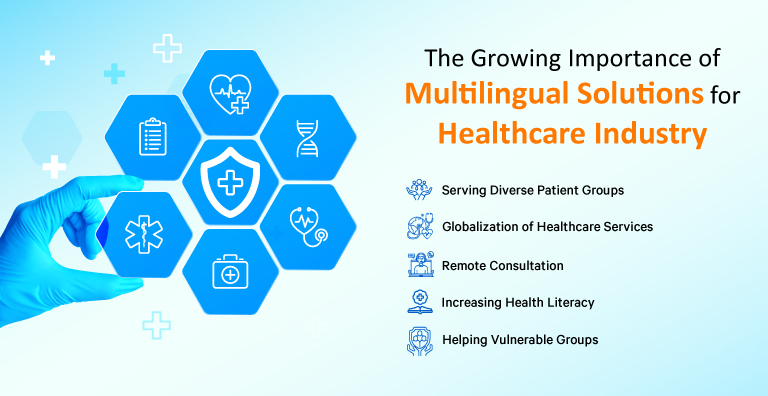Healthcare has undergone significant transformations in recent years. While being more technology-driven, it has become more experience-centric as well. So, today, patients expect much more than merely healthcare from their providers. They look for seamless and delightful experiences.
One of those evolved expectations is multilingual treatment. It refers to a more personalized service that amplifies the overall quality of treatment and patient satisfaction. Healthcare multilingual solutions play a significant role in catering to the evolved expectations of patients. Let’s see precisely why the demand for a multilingual solutions for healthcare is so high these days.
8 Factors Driving the Importance of Healthcare Multilingual Solutions
While specific factors may vary with the region, here are eight global factors that drive the significance of a healthcare translation solution.
1. Serving Diverse Patient Groups
Healthcare providers, especially global ones, serve a diverse group of patients. These patients belong to varying cultural and linguistic backgrounds. Having a multilingual healthcare translation solution can help serve these patients by responding to their queries and concerns in their language.
Quick responses in their language can help enhance the overall patient experience. Patients will feel more comfortable interacting with a multilingual chatbot, for instance, that speaks their language and provides accurate answers. While it can prove useful in regular situations, it can also help reduce anxiety during medical emergencies, wherein patients or those handling them require comprehensible responses to understand a particular set of instructions.
2. Enhancing Patient Outcomes
Overcoming linguistic barriers is crucial for every industry. However, in healthcare, it is critical, as it could be a matter of life and death for someone! Accordingly, using a multi-language healthcare solution for translating websites, mobile apps, chatbots, etc., can help facilitate clear communication. Additionally, it will enable a better understanding of treatment, ensure a clearer diagnostic comprehension, and lead to a more informed treatment. The result is better patient outcomes wherein patients are informed about the treatment involved.
3. Globalization of Healthcare Services
Another significant reason for the rise of multilingual solutions in the healthcare sector is the need for globalization. Every healthcare player intends to go global and expand its scope of operations. Multilingual solutions serve their aspirations on the language front. Furthermore, with medical tourism and cross-border healthcare becoming more popular, healthcare providers are serving international clientele. Multilingual solutions enable healthcare organizations to serve patients from varying nations, languages, and cultural backgrounds.
4. Remote Consultation
In many cases, limited mobility, distance, time or commercial restrictions make it challenging for patients to travel to the healthcare provider. In situations like these, a language solution for healthcare can help healthcare providers provide remote healthcare services in the patient’s language. Thus, the patients can seamlessly interact with their healthcare provider remotely in their language and understand every bit of the advice they receive.
5. Increasing Health Literacy
Augmenting health literacy is a critical concern towards which every country is working. However, it is obvious that you cannot expect people to become literate with insights about a particular disease, condition, vaccine, etc., in a foreign language. Here, a multilingual solution for healthcare plays a crucial role by bridging language gaps and also supporting a country’s efforts in enhancing healthcare literacy. It can promote a better understanding of a particular medical information and preventive measures for a specific condition.
6. Helping Vulnerable Groups
Some communities like refugees, immigrants, or indigenous groups may confront barriers due to linguistic limitations and cultural factors. Multilingual healthcare solutions can help address these gaps by providing healthcare services and information accessible in the language of the target community.
7. Compliance
Many countries have legal and regulatory requirements that make it imperative for healthcare providers to make information accessible in the patient’s language. Deploying a healthcare multilingual solution to translate web apps, websites, mobile applications, patient instructions, doctor manuals, etc., in the local language helps healthcare providers stay compliant.
8. Emergency and Disaster Management
During emergencies or disaster-like situations, time and clear communication are of the essence. A multi-language healthcare solution can prove helpful in situations like these by translating critical information into the local language to ensure emergency response efforts reach unilingual communities with limited or no proficiency in languages like English.
Revolutionizing Healthcare with Linguify – A Multilingual Solutions for Healthcare
Going multilingual is as significant for healthcare as it is for other sectors. Making targeted efforts in the multilingual direction can benefit both, healthcare providers as well as the communities they serve.
Linguify, a healthcare translation solution, can help serve the multilingual needs of the healthcare sector. It is a thoughtfully designed language solution for healthcare that offers various features, including the following.
- Support for 200+ Indian and foreign languages
- Comprehensive content change management
- Multiple CMS compatibility
- SEO compliant translations
- Complete life-cycle outsourcing
- No-code capabilities
Personalize healthcare with Linguify’s multilingual and translation capabilities. Email LinguaSol at sales@linguasol.net to explore more.
Ref. No- LSB5241045

